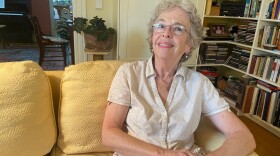Conway, Massachusetts author Roland Merullo recently published "Dessert with Buddha," the last of what he calls his Buddha books. The series started 16 years ago with "Breakfast with Buddha."
Each book is framed around a road trip taken by two brothers-in-law: Otto Ringling and Volya Rinpoche, who is a Tibetan meditation teacher married to Ringling's sister.
Merullo said he gets his ideas from real-life road trips he takes with his wife and two daughters.
Roland Merullo, author: I get in the car and I see what happens. When the kids were along, they would say, "Dad, Rinpoche would like this place" or "Did you see that, Dad?" And so, they all contributed.
And the road trips make it really easy to write because they're a skeleton. Then, on that skeleton, I have to put the flesh of conversation, characterization and so on.
Nancy Eve Cohen, NEPM: In "Dessert with Buddha," the two men are on a road trip. Otto switches on the radio and the two hear a newscast about the war in Ukraine and pockets of COVID in the United States.
Could you read this part where Otto says these broadcasts are making people depressed?
The news seemed designed to make us feel guilty, terrified, hopeless, or all of the above. I confronted the same shadows, of course. On certain nights, even before the outbreak of war in Ukraine, alone in the big Bronxville house, with my wife gone, career over, and children far away, I'd felt as though something was seeping out of the walls, some bad spirit, uttering the words of a radio broadcast, portending a dark, new chapter of history.
But, over the years of our acquaintance, my brother-in-law had given me an antidote to all that. He'd introduced me to meditation, patiently guided me through a disciplined practice, and while those quiet hours hadn't resulted in any mystical visions, hadn't cured the usual aches and strains of advancing age, hadn't changed the actual societal ills by even the smallest bit, they had given me a measure of contentment.
Do you meditate?
I do. I have meditated since I was 25. So, 45 years.
And so, have you discovered what Rinpoche wants Otto to discover?
Partly, I would say. You know, I mean, definitely it has changed me and helped me — just sitting quietly mostly every day and watching my thoughts has been very, very helpful.
How does it contribute to your writing?
It makes it easier to write. For me, it takes away a lot of the clutter inside my mind. And so, when I when I want to find a word or a scene or the next step in a plot, it's much easier for me to do that.
And it also, perhaps more importantly, makes me aware of — I wrote a little book called "The Demons of the Blank Page," which is just about why people get writer's block, why people are overly self-critical, why people can't handle criticism even though they know it would be helpful to their writing.
And meditation has been unbelievably helpful to me in that regard. It just shows me that what's going on in my own brain — "This is no good. Nobody will like this. The editors won't want this." — you have to learn to just let that stuff go, and work.
I enjoyed reading the book and towards the end, Otto is having a premonition — and it's not a good one. And I didn't want to finish the book because I had a feeling something bad was going to happen. So, this is kind of a spoiler alert, but can you talk at all about the way you ended it?
I didn't want to write realistic novels about the spiritual challenge of being alive and have only good things happen. So, at the end of this book, something difficult happens — I don't want to get into it exactly. And I did that on purpose because those kinds of things happen to all of us, and we want to say no to them and we have to somehow say yes to them. And that can be brutally difficult.
And do you think this book helps people in terms of getting through these difficult things?
One of the most beautiful parts of my life is the notes I get from readers and I get even — "Breakfast With Buddha" was written in 2007, 16 years ago — I would say every single week I get one or two notes from readers, sometimes from all over the world, usually all over America.
And many of those notes say, "My partner was diagnosed with cancer, and this book really helped me," or "I lost my beloved mother and this book really helped me" or "I was confused or anxious and this book really helped me."
And I can honestly say I did not set out to do that. But those are the most gratifying pieces of my day.








